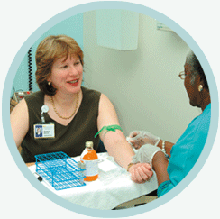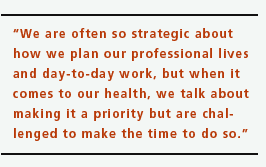|













|
 |
 |
Many
people begin the New Year resolving to adopt a healthier lifestyle—maybe
they will exercise more, they say; eat their veggies.
But Debra Bloom, associate administrator
for Emory Healthcare and Emory Hospitals, took it to another level
this year by becoming the first participant in a ground-breaking
diabetes screening  study
conducted by researchers at the Emory School of Medicine. study
conducted by researchers at the Emory School of Medicine.
“When I heard about this opportunity,
I thought it would be a good tool to help me plan a long-term strategy
to stay healthy and active and continue to participate fully in
all of the activities I enjoy,” she says. “We are often
so strategic about how we plan our professional lives and day-to-day
work, but when it comes to our health, we talk about making it a
priority but are challenged to find the time to do so.”
Although diabetes may not immediately
spring to mind as a health priority, researchers believe as many
as 35 million Americans have a condition known as impaired glucose
tolerance (IGT), a precursor to development of full-blown diabetes,
the leading cause of blindness and kidney failure in this country.
Unfortunately, most people are unaware they have IGT, and there
is no standard diagnostic test to detect it before symptoms appear.
Now, thanks to a $2.9 million grant
from the National Institute of Diabetes, Digestive and Kidney Diseases, Emory is launching the first effort ever to develop a routine screening
test to detect IGT.
Emory is launching the first effort ever to develop a routine screening
test to detect IGT.
“Progression from IGT to diabetes
can be forestalled, but diabetes risk-reduction programs are most
effective if IGT is identified early,” says endocrinologist
Lawrence Phillips, the lead investigator of the project, known as
the Screening for Impaired Glucose Tolerance (SIGT) Study.
Employees at Emory University, Grady
Memorial Hospital, and Morehouse School of Medicine are being asked
to do their part by volunteering as subjects because investigators
need to evaluate the glucose tolerance of at least 2,100 people
over a three-year period.
In the first month of screening, researchers
identified five people with IGT and one person with diabetes, says
Phillips. “These people are getting a head start on treatment,
and what we learn from them will also help many more people.”
Volunteers will be asked to make two
visits to the General Clinical Research Center; there are sites
at both Emory University Hospital and Grady Memorial Hospital. There,
they will be asked to give small blood samples before and after
consuming a sugary drink. In return, all participants will receive
their personal test results and an explanation of what the results
mean.
To participate in this study, please
call Emory HealthConnection at (404) 778-7777. Additional information
is also available at the SIGT study website http://www.med.emory.edu/research/GCRC/SIGT. |
 |
| |
|
|
| |
|
|
|
|
|

